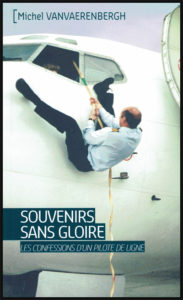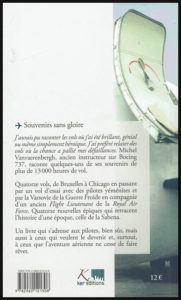The title of this French book could be translated as: “Memories without glory: the confessions of an airline pilot”. A bit of modesty was certainly required in order to publicly expose one’s own flying mistakes, especially when that person is an airliner captain.
However, the book does not relate only some of the errors made by the author, Michel Vanvaerenbergh, but also those of the crew members working at the time for the Sabena airline company.
Generally, flying errors are discussed in private and corrective actions are published by each airline company for their staff in order to limit the risk of repeating the same mistakes. But to actually publish a book on one’s own mistakes is quite original and also very useful. Beginners or experienced pilots will certainly profit from the author’s past experiences.
Some of the stories are quite scary: on several occasions, the reader realizes that the pilots and passengers were lucky to survive a flight. Once, the pilots had to decide if a runway was long enough for take-off. They did not have the appropriate documents on board to calculate what was needed and the Sabena office was closed. They estimated that they could do it but realised too late that is was not the case, seeing the end of the runway approaching quickly. They forced the Boeing off the ground before it had reached the appropriate speed. The aircraft refused to climb for seven minutes. That meant that the aircraft was close to stalling and that everyone on board nearly escaped death.
The author tells the story of crew members under the influence of alcohol with whom he had to deal with. There is also the unbelievable account of a test flight with Yemeni pilots who never used the appropriate charts to adjust the parameters of the aircraft. To make it easier, they preferred assuming the aircraft was always at its maximum weight.
On a few occasions, too much assertiveness from pilots and crew members almost resulted in an airliner crash.
The literary style has only one objective: go straight to the point. So forget any fanciful writing. Moreover, there are no paragraphs in this small book, something to which I was not used. But those are only details and the reader can easily deal with them.
Considering the intensity of real life stories, “Souvenirs sans gloire” is certainly a book not to be missed, especially for the aviation enthusiast.
Click on the link for other books relating specifically to human behaviour on my blog.

